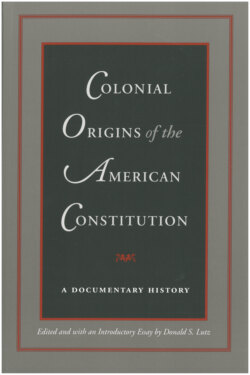Читать книгу Colonial Origins of the American Constitution - Группа авторов - Страница 23
На сайте Литреса книга снята с продажи.
Оглавление16
[Salem Oath for Residents]
April 1, 1634
Although a part of the Massachusetts Bay Colony, Salem established its own town government early in its existence. About the time that the Massachusetts Bay Colony was evolving a more liberal oath, led by Cambridge (see the previous document), Salem was moving in a contrary direction and attempting to exert more careful control over its population. Part of this attempt took the form of requiring even those outside the franchise to take an oath of allegiance to the colony. The following document comprises that oath and should be compared with the Massachusetts Agreement on the Legislature [14].
Taken from Charles Evans, “Oaths of Allegiance in Colonial New England,” Proceedings of the American Antiquarian Society, n.s., 31 (April 13–October 19, 1921): 393–94. The text is complete and unaltered.
At A Court holden att Boston, April 1th, 1634.
It was further ordered, that euy man of or above the age of twenty yeares, whoe hath bene or shall herefter be resident within this jurisdiccon by the space of six monethes, as an householder or soiorner, and not infranchised, shall take the oath herevnder written, before the Gounr, or Deputy Gounr, or some two of the nexte Assistants, whoe shall haue power to convent1 him for that purpose, and vpon his refuseall the second tyme, hee shalbe banished, except the Court shall see cause to giue him further respite.
THE OATH OF RESIDENTS
I doe heare sweare, and call God to witnes, that, being nowe an inhabitant within the lymitts of this juridiccon of the Massachusetts, I doe acknowledge myselfe lawfully subject to the aucthoritie and gouermt there established, and doe accordingly submitt my pson, family, and estate, to be ptected, ordered, & gouerned by the lawes & constitucons thereof, and doe faithfully pmise to be from time to time obedient and conformeable therevnto, and to the aucthoritie of the Gounr, & all other the magistrates there, and their successrs, and to all such lawes, orders, sentences, decrees, as nowe are or hereafter shalbe lawfully made, decreed, published by them or their successrs. And I will alwayes indeavr (as in duty I am bound) to advance the peace & wellfaire of this body pollitique, and I will (to my best power & meanes) seeke to devert & prevent whatsoeyer may tende to the ruine or damage thereof, or ye Gounr, or Assistants, or any of them or their successrs, and will giue speedy notice to them, or some of them, of any sedicon, violence, treacherie, or othr hurte or euill wch I shall knowe, heare, or vehemently suspect to be plotted or intended against them or any of them, or against the said Comon-wealth or goumt established. Soe helpe mee God.
